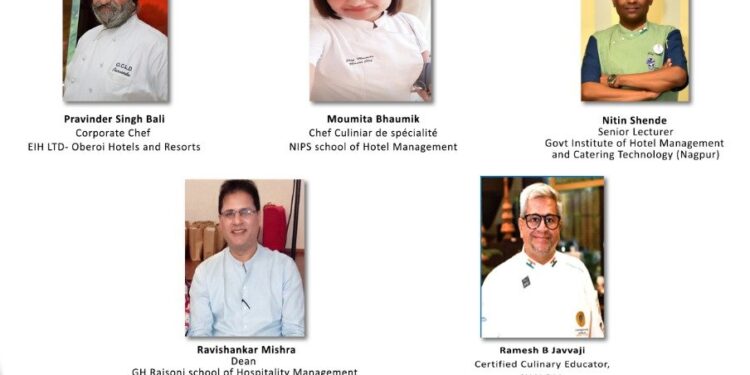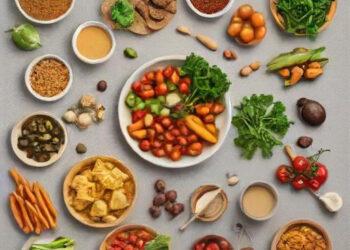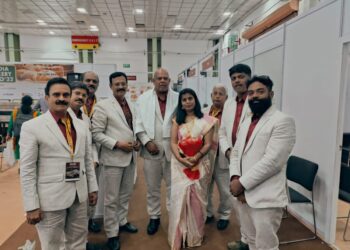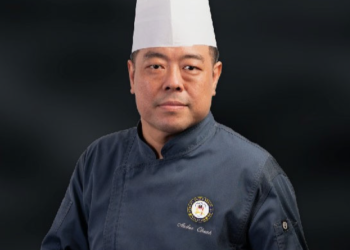-Ayshwaria Lakshmi
ChefBharath.com had recently conducted a panel discussion on National Education Policy – Importance of Culinary in National Education Policy. The website brought leading academia for the session who shared their views on the importance of culinary education to be brought at a tender age.
The participants of the panel discussion consisted of chefs from various backgrounds and from different parts of the country. We had Chef Pravinder Singh Bali, Corporate Chef Learning and Development from EIH LTD- Oberoi Hotels and Resorts, Chef Moumita Bhaumik, Chef Culiniar de spécialité from NIPS School of Hotel Management, Chef Nitin Shende, Senior Lecturer from Government Institute of Hotel Management and Catering Technology, Chef Ravishankar Mishra, Dean from GH Raisoni school of Hospitality Management and Chef Ramesh B Javvaji, Senior Chef’s Mentor from SHALOM.
Need for the inclusion of basic culinary education at primary/secondary school levels
The chefs in the panel agree that the students should be given culinary training at an early age. Parvinder was in the team to develop the curriculum for a scheme by the Ministry of Skill Development to start the culinary training for students in class 9 onwards. “When I had one to judge the World Skills competition, I saw teenage kids who took part in it,” he adds. He believes the kids being given appropriate training can help then hone their culinary skills at a young age.
Nitin believes that training can be started in class 7 or 8 as the technical education classes. He said, “Basic modules like bakery, confectionery can be introduced, which can incline the students’ interest towards Culinary education.”
Ravishankar says He has witnessed the young kids are interest and innovative nature in creating dishes in competition when he was the judge. “Some schools have culinary as hobby classes. They should make it part of the curriculum at class 5 or 6,” he adds.
Ramesh who has 4 decades of training experience says the youngsters should be taught nutritional value at an early age. “They should know what comes from where and what are nutritional value each food has, what are should be consumed more and what should be consumed less,” he said. “such Vocational learning should be inculcated at a younger age.”
Moumita believes they kids should be taught the theory part of culinary as early as class 1. “The kids are being taught Robotics, Archery at class 1. If they are taught these at such a young age, why not inculcate the habit of good and nutritional food,” she said.
Overall, the chefs accept that the more people are aware of the chef profession and the parents have started to believe that wearing a chef’s coat is prestigious as wearing a doctor’s coat. Likewise, the children should be taught that one cannot survive without a nutritional-balanced diet and not on Junk food.
The current state of Indian culinary education comparison to the global standards, student-teacher evolving as a mentoring,
Moumita – We woke up late. The rest of the world had accepted culinary as professional pretty much earlier than we did. We recognized it only after international channels telecasted culinary shows. But we still lack in many aspects of it. In India, the education is majorly Hotel management and not Culinary training. We have few good colleges that educate in culinary in Pune and South India. But that’s about it, most of them train students for Hotel management.
Ravishankar – We have to first point out that Cooking food is only a part of culinary training. People don’t know the meaning of culinary and what exactly is included in culinary. Even in cooking, there is more than just making food. It is an art, which should be explained and pointed to the public.
Parvinder – The problem is the majority of the people look at this profession and think cooking means working in a Dhaba or a hotel kitchen. Nearly 70-80 percent of the Indian population, mostly in the rural and tier 2,3 cities, still don’t accept chef as a profession. The is mindset has to change. Another issue we face in education, is students enter the field to become a celebrity chef. They don’t’ know the reality of the industry. Nearly 40% of students drop out once they realize what is this field all about. In another aspect, the problem also lies with our education system being too boxed and we still follow the Guru Shishya Parampara. With everything boxed, how can we expect our students to think out of the box? This is one of the reasons why the students should be taught to analyze and start to think critically at a younger age.
Ramesh- We have a guru-shishya Parampara (lineage). It is important to not just have a guru who teaches you or a role model whom you would look up to. Its good to have a hero, but its important to learn the right things like a child who learns from their parents on how to behave and mannerisms. This can be learned only if there are a mentor and mentee relationship. It is important to have this kind of relationship only then the mentee will be able to gauge a lot of things learned from the being mentored. In other words, you can catch something by learning but you can develop your skills only from mentoring.
Overall, the educators believed that the mindset of the public and the chef instructors should go through a change, only then we can move forward in the chef profession to meet the global standards.
New standards for culinary education and standardizing the C-Schools
The chefs in the panel believe that its not easy to standardise the culinary education in India. For it to be standardised, the teachers should be given proper and appropriate training, a learning module for the teachers should be given. These trained teachers can then create a module for the students. It should also be noted that the student training should have adequate equipment’s and safety features built in. “You cannot have few stoves and teach the students to cook. The mindset should change. Culinary include health hygiene, cleanliness, process and much more. The training should all of this,” said Parvinder.
The panelists also believe a council should be created to regulate education. “Indian Federation of Culinary Association keeps pointing out that the education has given and the actual field process have a lot of difference. The council should look into this and create a curriculum based on the same,” said Nitin.
According to Ravishankar, this regulatory body should also make sure the standards of education provided should be a top priority with well-equipped infrastructure. “Since we do not have this, the training is given and infrastructure is below standards,” he adds.
Moumita points out that the regulatory body should also make sure the instructors have the adequate on-field experience, apart from regulating the course. “People with less than 4 years’ experience take up teaching as they could not put up with the pressure,” she adds.
Ramesh also adds that specialised training should be given in culinary education. For this, a proper system should be in place providing the clarity of the course. A wholesome culinary training should be part of the education, where students have the provisions to learn courses like bartending, carving, and others.
(Audio description of the session is available by clicking here– )







